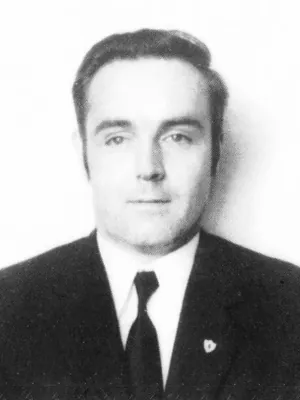Seamus Heslin
Biography

Early Life
James Augustine (Seamus) Heslin was born on 1 September 1934 in Drumcauskeen, Cloone, County Leitrim, Ireland. He was the eldest of eight children in a farming family, the son of Patrick Heslin and Margaret (née Reynolds). Heslin attended Rossan National School from 1939 to 1948 and showed early academic promise in his rural primary years. In 1948 he won a scholarship to the prestigious St. Mel’s College in Longford, but he never settled there; instead, in a characteristically independent move, he bought a bicycle and transferred to St. Mary’s Seminary in Moyne (the “Latin School”) in County Longford. At Moyne, he thrived under the tutelage of Monsignor James Faughnan, an outstanding teacher who became a lifelong mentor. Heslin completed his secondary education in 1953, and his strong performance earned him a Leitrim County Council scholarship to University College Dublin (UCD), marking the start of a remarkable academic journey.
Education
Heslin pursued higher education at UCD, where he studied commerce and economics. He graduated with a Bachelor of Commerce (B.Comm.) degree, earning first-class honours, and went on to complete a Master of Economic Science (M.Econ.Sc.) at UCD as well. Furthering his scholarly qualifications, he undertook postgraduate research at Trinity College Dublin, obtaining a Master of Letters (M.Litt.) in 1974. In addition to his degrees in economics, Heslin earned professional qualifications in education, including a Higher Diploma in Education and a Diploma in Physical Education. These credentials enabled him to begin his career as a secondary school teacher and reflect his commitment to pedagogy. This broad educational foundation – spanning commerce, economics, and teacher training – equipped Heslin with a unique blend of expertise in both economic theory and educational practice.
Academic Career
After completing his studies, Heslin spent a decade teaching at the secondary level in the 1950s and 1960s, where he gained practical classroom experience. In January 1969, he was appointed as a College Lecturer in the Department of Political Economy at University College Dublin. He would remain on the faculty of UCD for the next thirty years, educating generations of students in economics until his retirement in 1999. As a lecturer, Heslin covered a wide range of courses for both undergraduate and postgraduate students, and he became known as a dedicated and approachable teacher. Former students recalled him as an “inspirational teacher and influential mentor,” particularly to newcomers arriving from rural areas to the large university.
In his academic work, Heslin specialized in public economics. His primary research interests lay in the field of public finance – especially the management of public expenditure and debt – and he kept a keen analytical eye on economic policy issues facing Ireland. He contributed to the intellectual life of the university through both teaching and scholarship, and was part of a cohort of economists guiding Ireland’s understanding of economic development in the later 20th century. While he did not seek the limelight, Heslin’s expertise in fiscal policy and his thoughtful approach to economic problems earned him respect among colleagues and students alike.
Publications
Heslin authored two books in the early 1970s that reflected his interest in economic history and policy. The first, From Ormond to Mansholt, was published in 1971 (Dublin: Folens) as part of an economic history series. This work provided an overview of Irish economic development, and it proved influential as a teaching text – it was used as a senior economics textbook for Ireland’s Leaving Certificate students in the 1970s. His second book, Manpower Policy in Our Primary Sector, examined labor and development issues in Ireland’s agricultural sector. Together, these two books solidified Heslin’s reputation as an insightful economist with a deep understanding of Ireland’s economic challenges from historical and policy perspectives.
In addition to his books, Heslin was a regular contributor to The Leitrim Guardian, an annual county journal, where he published articles on regional development, demography, and education. His writings in The Leitrim Guardian span several decades and highlight his engagement with the socio-economic issues of his home county. For example, in the 1977 edition he authored “Leitrim’s Dwindling Population: A Demographic Freak,” an analysis of the county’s persistent population decline and its unique demographic trends. The following year, he wrote “Regional Policy: A Ray of Hope for Undeveloped Areas”, in which he discussed strategies for stimulating economic growth in underdeveloped rural regions like Leitrim. A decade later, in the 1989 issue, Heslin penned “From a Tiny Acorn… The Story of the Latin School and the Man Who Made It,” a reflective piece recounting the history of the Moyne Latin School and celebrating the educational legacy of Monsignor Faughnan, his former teacher. Through these and other articles, Heslin brought scholarly attention to rural Ireland’s challenges – such as depopulation and economic imbalance – and advocated for thoughtful policies in education and regional planning. His contributions to The Leitrim Guardian were highly regarded, providing locals with nuanced perspectives on their community’s development within the broader national context.
Civic and Cultural Contributions
Beyond his formal academic roles, Seamus Heslin was actively involved in civic and cultural life, especially within the community of Leitrim natives in Dublin. He was a prominent member of the Leitrim People’s Association in Dublin, a diaspora organization, and in 1969 he served on its county debating team that won a national inter-county debating competition. Alongside teammates Liam Maguire and Pat Earley, Heslin helped secure an All-Ireland title in debate for the Leitrim Association, demonstrating that Leitrim people “can be the equal of any in Ireland” in intellectual competition. The following year, 1970, he was part of the Leitrim team that successfully defended their championship title (with Padraic White in place of Pat Earley), achieving back-to-back victories in the All-Ireland debating competition. These successes were a source of pride for the Leitrim diaspora and highlighted Heslin’s talents in public speaking and reasoned argument. He also supported the Association’s other cultural and social activities, contributing to its mission of community solidarity.
Heslin remained deeply connected to his rural roots and Leitrim heritage throughout his life. He had a passionate love of Gaelic sports, particularly Gaelic football, which had been evident from an early age. In his youth, he was a constant presence on Cloone GAA teams, and he won junior and senior league championships with Cloone during the 1950s and 1960s. Even after moving to Dublin, he continued to play for a time with a team of westerners in the Phoenix Park league, keeping alive his connection to the sporting culture of home. Equally, Heslin was a man of strong faith and tradition; he was described as a devout Catholic and participated in numerous religious pilgrimages to the Sanctuary of St. Patrick on Lough Derg, reflecting the values of the community in which he was raised. Living in Glasnevin, Dublin, he nevertheless “kept in close touch” with events in County Leitrim from afar, following local news and developments avidly. He contributed whenever possible to Leitrim initiatives – whether by writing insightful articles for The Leitrim Guardian or by offering advice and encouragement when he heard the name of his beloved county mentioned. Friends and colleagues noted that, despite his long residence in the city, “his heart remained with the rural ways of life” and he was always ready to lend his expertise to benefit his home community.
Legacy
Seamus Heslin’s life and work left a lasting impression on both the academic field of economics in Ireland and on the local community he cherished. He died on 13 October 2010 in Dublin, at age 76, after a brief illness. His passing was marked by tributes that acknowledged his dual legacy as a scholar and a community advocate. In the academic realm, Heslin is remembered as a thoughtful economist and dedicated educator who influenced generations of students at UCD. Through his teaching, he helped shape many young economists and public servants, instilling in them a rigorous understanding of public finance and economic policy. His published works – from textbooks to articles – contributed to Irish public economic thought by addressing critical issues such as fiscal management, regional imbalance, and rural development. These writings, grounded in both theory and the practical realities of rural life, remain a part of the discourse on Ireland’s economic and social evolution.
In County Leitrim and among its diaspora, Heslin is fondly remembered as a native son who never forgot where he came from. He exemplified the role of the public intellectual who bridged academia and community: using his expertise to analyze local problems and propose solutions, and using his voice to celebrate and defend the rural experience. Whether through his leadership in a debate, his articles in the county journal, or simply his presence and counsel at community gatherings, Heslin contributed significantly to the cultural and intellectual life of his community. His commitment to rural Ireland’s advancement – paired with his personal kindness, mentorship, and deep sense of identity – ensured that his legacy would endure. Seamus Heslin’s name lives on in Leitrim as an educator, economist, and advocate who left an indelible mark on both his students and his home place.
Works
Books
- From Ormond to Mansholt (1971)
- Leitrim’s Dwindling Population: A Demographic Freak (1977)
- Regional Policy: A Ray of Hope for Undeveloped Areas (1978)
- From a Tiny Acorn... The Story of the Latin School and the Man Who Made It (1989)
- Manpower Policy in Our Primary Sector
References
- Champions All (1971). The Leitrim Guardian, 58. Retrieved June 25, 2025, from https://leitrimdoc.ie/leitrim-guardian-journal-1969-1999/.
- Daly, D. (2010, November 19). In Appreciation: James Augustine (Seamus) Heslin 1934-2014. Leitrim Observer, p. 17.
- Heslin, S. (1977). Leitrim’s Dwindling Population: A Demographic Freak. The Leitrim Guardian, 89-91. Retrieved June 25, 2025, from https://leitrimdoc.ie/leitrim-guardian-journal-1969-1999/.
- Heslin, S. (1978). Regional Policy: A Ray of Hope for Undeveloped Areas. The Leitrim Guardian, 91-93. Retrieved June 25, 2025, from https://leitrimdoc.ie/leitrim-guardian-journal-1969-1999/.
- Heslin, S. (1989). From a tiny acorn… The story of the Latin School and the man who made it. The Leitrim Guardian, 101-103. Retrieved June 25, 2025, from https://leitrimdoc.ie/leitrim-guardian-journal-1969-1999/.
- Irish Times. (2010, October 15). Heslin, James A: Death. Irish Times Family Notices. https://notices.irishtimes.com/death/heslin-james-a/6605221
- Leitrim People’s Association: Dublin Tidings (1970). The Leitrim Guardian, 124. Retrieved June 25, 2025, from https://leitrimdoc.ie/leitrim-guardian-journal-1969-1999/.
